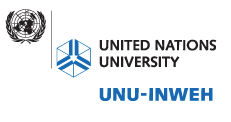The UN University Institute for Water, Environment and Health (UNU-INWEH) contributed to efforts to define the post-2015 development agenda in four key ways in 2013, according to its 2013 Annual Report.
To address the growing global water crisis, the report recommends a holistic ecosystem approach encompassing cultural, economic, physical and socio-economic factors.
 March 2014: The UN University Institute for Water, Environment and Health (UNU-INWEH) contributed to efforts to define the post-2015 development agenda in four key ways in 2013, according to its 2013 Annual Report. To address the growing global water crisis, the report recommends a holistic ecosystem approach encompassing cultural, economic, physical and socio-economic factors.
March 2014: The UN University Institute for Water, Environment and Health (UNU-INWEH) contributed to efforts to define the post-2015 development agenda in four key ways in 2013, according to its 2013 Annual Report. To address the growing global water crisis, the report recommends a holistic ecosystem approach encompassing cultural, economic, physical and socio-economic factors.
First, UNU-INWEH has provided evidence for formulating, implementing and monitoring water-related Sustainable Development Goals (SDGs). It recommends, inter alia, that water be treated as a cross-linked issue. As part of this work, UNU-INWEH and the UN Office of Sustainable Development (UNOSD) conducted analysis that puts a ‘sticker price’ on accomplishing water-related SDGs.
UNU-INWEH is analyzing the economics of land degradation (ELD) as part of a global consortium. This work aims to illustrate how sustainable land management (SLM) can facilitate neutral land degradation and desertification and how diminished land productivity could affect food and livelihood security.
Third, UNU-INWEH is engaged in an advocacy campaign to meet the sanitation-related Millennium Development Goal (MDG) target.
Finally, UNU-INWEH and the UN Economic and Social Commission for Asia and the Pacific (UNESCAP) are leading a UN-Water Task Force on water security, including the organization of a series of regional expert consultations.
Following a dialogue on its programmatic structure, UNU-INWEH will frame its future work through two integrated programmes: Water and Human Development; and Water and Ecosystems.
The report includes sections on: UNU-INWEH’s programmes on coastal, dryland and freshwater ecosystems and the water-health nexus; projects and activities; capacity building efforts; and science-policy bridging work on the global water security agenda and engagement with the UN Convention to Combat Desertification (UNCCD). It also includes descriptive lists of active partnerships, publications and staff. [Publication: 2013 Annual Report] [UNU-INWEH Website]